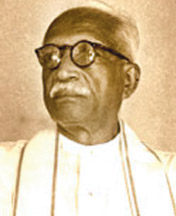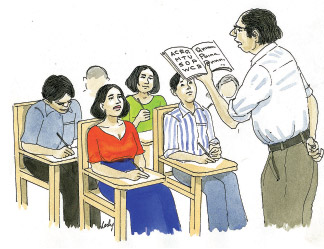|
Free Education proposals and tuition - Part II:
Examination system issues
Text of the Dr. C. W. W. Kannangara Memorial
Lecture -22 by Prof. A. V. Suraweera held at National Institute of
Education, Maharagama on October 13, 2011
Now, the last paragraph of his rider submitted by Dr. Kannangara
speaks eloquently of his dedication to the course of free education.
 |
|
Dr. C. W.
W. Kannangara |
“I should like to refer to a matter of the utmost importance, i.e.
The growing demand for free education from the primary stage right up to
the university with a view to giving every child in this country the
fullest opportunity for the development of his talents irrespective of
the means of his parents. The Committee considered the question of free
education in the early stages of their deliberations and, chiefly owing
to the financial position of the country at that time decided to
recommend free education upto the top by stages. However, the changed
conditions due to the war and the fact that free education throughout a
student's career is bound to be one of the essential features of a
suitable post war educational system in this country, make it imperative
that this necessary reform should be put into operation at the earliest
possible opportunity. I am glad that the Committee have during the final
stages of their deliberations, definitely decided on free education. I
strongly support the decision...”
The rider of the chairman begins with these words:
“Although there are some points which I do not see eye to eye, with
the views of the majority contained in the report, I subscribe to it as
a whole.”
Kannangara as an experienced politician knew how to get things done
in his own way overcoming opposition.
The Committee report has recognized at least three categories of
schools, namely, (a) State schools, (b) Assisted schools (counterpart of
denominational schools), (c) Private and unaided schools. Says the
report: ” ...no undue restriction be placed on unaided schools,but that
power be taken to inspect them to ensure that they maintain a minimum
standard in regard to accommodation including playground, equipment,
staff and efficiency of instruction given.” Again sec.350 with the title
‘Private or Unaided schools’ briefly explains the above. Strangely
enough, this section contains also the phrase ‘private tutories'. I will
be dealing with this topic in the second part of my talk.
The denominational system
Dr. Kannangara was personally opposed to the continuance of the
denominational system as well as the Private and Unaided schools.
“A most deplorable and disturbing feature of the educational system
in vogue since the British connection has been inequality of opportunity
which had been aggravated by the denominational system. Religious
communities with comparatively less resources and without organizational
strength and solidarity have long suffered under a sense of frustration
and a sense of injustice...”
However with regard to the denominational system of education that
had been in vogue for some time, the majority opinion had prevailed to
make a recommendation as follows:
“...the system of direct state control and the system of
denominational control should permitted side by side.”
Dr. Kannangara's respect for the opinions of others and his
democratic attitudes are evident when one considers the final
recommendations of the committee. He had not objected to certain
proposals even when they were not to his liking.
Further, the definition and the intended meaning of Free Education as
given in the Committee report deserves our attention. Firstly, it says
that “no tuition fee whatever will be charged for any type of
education.” Then it goes on to define the ‘cost of education’ for State
schools and Training colleges, Assisted schools and Training colleges in
addition to the Universities intended to be borne by the state. In case
of the Assisted Primary, Assisted Secondary and Senior schools the cost
includes the entire salaries of eligible staff, the cost of books and
school stationery for pupils including a grant for equipment. We refrain
from going into details.
 It is interesting to note the comments made by E L Bradby, Principal
of Royal College in his rider. While giving his consent to the main
views and decisions embodied in the report on Private schools and
Tutories, Bradby observes, “I strongly dissent from the attitude
expressed here which amounts to allowing unlimited scope for anyone to
exploit the education of children... for private profit and without ...
control of any kind ...”. Very true. It is interesting to note the comments made by E L Bradby, Principal
of Royal College in his rider. While giving his consent to the main
views and decisions embodied in the report on Private schools and
Tutories, Bradby observes, “I strongly dissent from the attitude
expressed here which amounts to allowing unlimited scope for anyone to
exploit the education of children... for private profit and without ...
control of any kind ...”. Very true.
Going back to the dissent of Ivor Jennings, while supporting the free
education policy he too objects to the continuance of private schools.
“Ideally it is desirable that every student should have the best
education without paying for it. The Committee has already denied that,
that principle is capable of application, for it agrees that private
schools should be permitted...”
It is strange why Kannangara had not expressed any dissent with the
proposal to recognize private schools and tutories and not foresee the
possible consequences that would result in some day or other. Not a word
on this vital area even in his rider, not even a reference to the
meaningful dissent of Jennings.
The examination system
Yet another area that had drawn the consideration of the Special
Committee Report deserves our attention, namely the Examination system.
This so-called necessary evil, the report points out has been inherited
from the colonial rulers under the British educational system. Coupled
with the examination system, were included the heavy load in the
curriculum, the examination mentality of the parents, teachers and
children, resulting in the creation of a system of private coaching
outside of school teaching.
“Parents frequently provide private coaches whose whole justification
is that they will get their pupils through examination.”
Further, the report observes:
“We strongly depreciate the practice too frequently adopted by many
parents of supplementing the school work by private coaching. In the end
it destroys its object by making the student incapable of originality
and initiative....”
These comments, farsighted as they were, regarding the education
system resulting from the examination mentality and the flourishing
coaching establishment as a result of the continuance of private schools
are our main concerns in the second half of this presentation.
As mentioned earlier, the responsibility of the Special Committees
had been to make recommendations so as to bring about a unified system
of education providing equal opportunities for all with a view to
bringing about a unified single Sri Lankan nation. In this endeavour,
the Committee had found that there existed discrepancies in the
disbursement of state funds enabling certain sections of the population,
certain religious groups in particular, to enjoy undue privileges over
others.
To be continued
|



